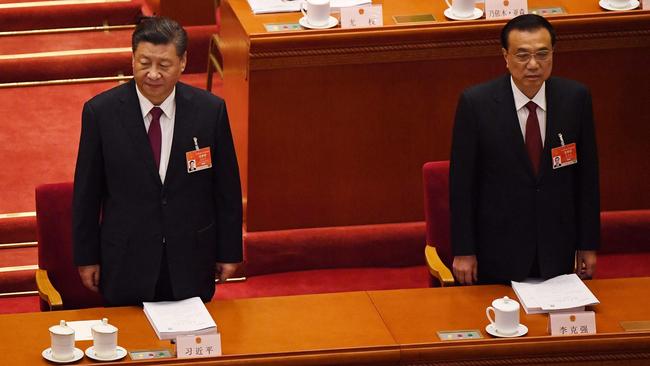China game plan to overtake US as world’s top economy by 2035
Chinese Premier Li Keqiang has outlined huge increases in science and innovation spending.

China’s leaders have outlined their plan to overtake the US as the world’s biggest economy by 2035, ramping up spending on science and innovation as Beijing attempts to shock-proof its juggernaut economy from further American sanctions.
Premier Li Keqiang on Friday revealed a growth target of “above 6 per cent” for 2021 — conservative by China’s standards — in a major address delivered in front of more than 2000 of the country’s political elite, including President Xi Jinping.
But a greater focus of Mr Li’s speech in Beijing’s Great Hall of the People were details of the leadership group’s longer term plan to double the size of its economy in the next 15 years, an ambitious target flagged by Mr Xi last November.
In the government’s work report — an annual policy-focused speech similar to a budget speech in Canberra — Mr Li declared “innovation” and “technology self-sufficiency” were now key priorities, committing to increase China’s research and development funding by “at least 7 per cent” over the next five years.
“We will improve our strategic scientific and technological strength,” China’s second-highest-ranking leader said.
Mr Xi’s leadership team is determined to reduce vulnerability to US-led supply chains after a bruising four years of sparring with the Trump administration, which attempted to cripple China’s tech giants, including Huawei and ZTE.
The success of the “people’s war” on COVID-19 — which has mostly brought the highly infectious coronavirus under control in the world’s most populous country — and China’s status as the only major economy to grow in 2020 has imbued tremendous confidence in China’s leaders ahead of the 100th anniversary of the Chinese Communist Party’s founding in July.
Shen Yi, a professor at Fudan University‘s School of International Relations and Public Affairs, told state media ahead of Mr Li’s speech that China’s future plans were so ambitious that a “falling US” can no longer serve as a standard. “It may be a bit aggressive but when we talk about 2035 we are just competing with ourselves,” Professor Shen said.
Damien Ma, the Chicago-based director of the research institute MacroPolo, said China’s goal to overtake the US as the world’s biggest economy was “implicit” in its 2035 vision. “Of course Beijing would never publicly tout this goal, in part because of the optics and potential backlash,” Mr Ma wrote in a briefing this week.
Advisers to China’s government are more open about a goal that would require its economy to grow annually by almost 5 per cent over the next 15 years. China passed 70 per cent of America’s GDP in 2020.
“It is very likely to be earlier than 2035,” Mei Xinyu, an adviser to China’s Ministry of Commerce, told The Australian.
“Since Obama came to power, China and the US have increasingly embarked on different directions,” said Professor Mei, speaking in a personal capacity.
“I personally believe that we must treat the US as a competitor, and we need to carry out a reasonable, beneficial and disciplined struggle with the US in order to safeguard China’s national interests, enterprises and citizens’ interests.”
Other experts said China’s focus on innovation and technological self-sufficiency would not solve its GDP growth problem in coming years.
“South Korea became much more innovative but its growth rate was cut in half,” said Yukon Huang, a Washington-based senior fellow with the Asia program at the Carnegie Endowment for International Peace.
“In the last 10 years, South Korea’s growth rate has been somewhere close to 3 per cent, (lower than) it used to be,” he told the South China Morning Post.
In his work report, Ms Li confirmed major changes to Hong Kong’s political system were imminent, although he gave no specific details on changes to ensure only “patriots” are involved in the city’s government. “We will resolutely guard against and deter external forces’ interference in the affairs of Hong Kong,” he said.
In the audience was the city’s Chief Executive, Carrie Lam, who like all the 5000-odd delegates in Beijing for China’s biggest annual political meeting — called the Two Sessions — was recently given a COVID-19 vaccine by Sinopharm, according to the Chinese pharmaceutical company’s chairman.
Details of the changes to Hong Kong’s political system may not emerge until after the completion of the National People’s Congress, China’s peak legislature, which sits in Beijing until next Thursday.
Ms Lam has already committed to fully co-operate with whatever Beijing decides.
Mr Li also pledged that China would strengthen its ability to defend its sovereignty.
China will increase its official military budget by 6.8 per cent to 1.355 trillion yuan ($270bn) in 2021. This compares to 6.6 per cent growth last year, which was the slowest growth rate since 1989. Overseas analysts believe the actual military spend is much higher, as it excludes many off-budget items.
Mr Li also repeated China’s desire to join the Comprehensive and Progressive Agreement for Trans-Pacific Partnership, a 12-country trade agreement that includes Australia and was originally championed by then US president Barack Obama as a way of countering China’s economic influence in the Asia-Pacific region. To join the trade pact, China would need the endorsement of all members, including Australia, with which it has waged a 10-month campaign of trade coercion on exports with an annual total of about $20bn.




To join the conversation, please log in. Don't have an account? Register
Join the conversation, you are commenting as Logout